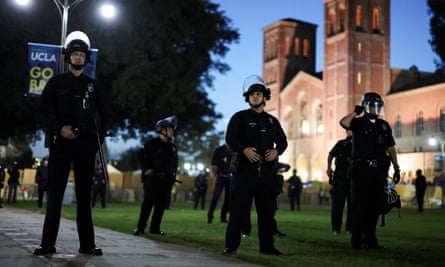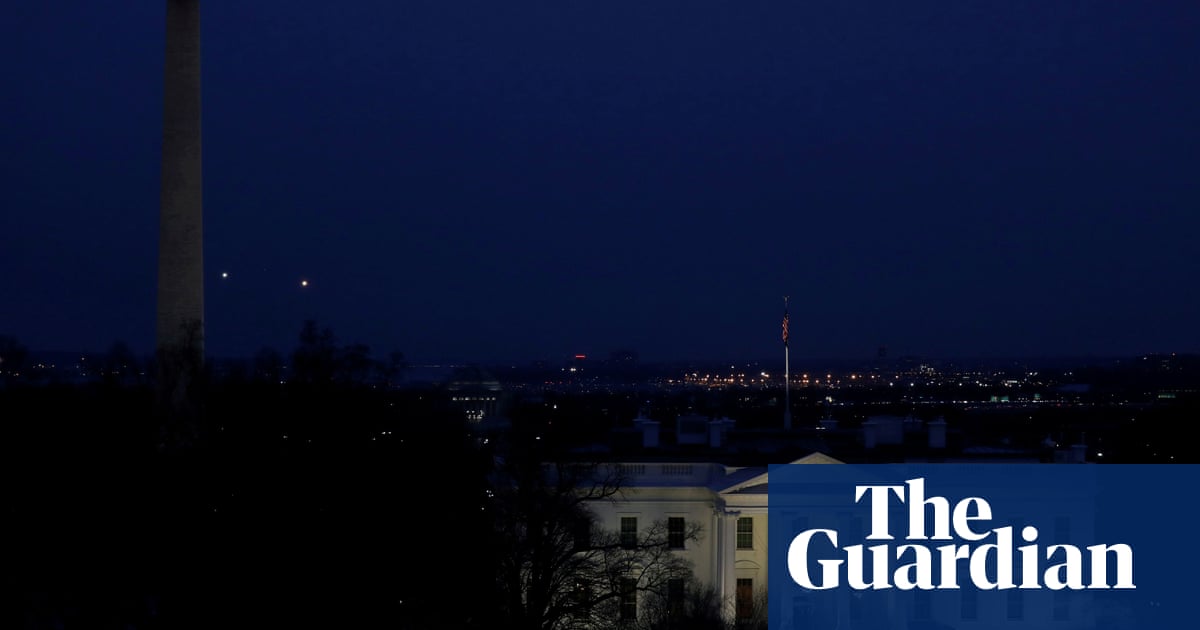At the height of the tensions on US campuses this week, with Republicans gleefully seizing on student unrest as an election issue that could propel Donald Trump back into the White House, Joe Biden tried to steer a middle path.
Weighing the democratic right to peaceful protest and the political necessity to stem disruption, Biden declared that “order must prevail”.
“Threatening people, intimidating people, instilling fear – none of this is a peaceful protest,” Biden said in a statement on Thursday. “Dissent is essential for democracy … There’s the right to protest. But not the right to cause chaos.”
His comments were his most notable intervention yet in the face of campus protests against Israel’s war in Gaza. The protests are a potential minefield for Biden.
As his lead over Trump among younger voters continues to slip significantly from its 2020 levels and as he tries to fend off Republican attacks, he risks alienating young voters by siding with police.
On the other hand, as riot police have moved against pro-Palestinian encampments and arrested thousands of people, senior Republican figures and Trump himself have been pushing hard to depict the US president as losing control and allowing America’s universities to slide into upheaval.
Fox News has lavished round-the-clock coverage to what it has portrayed as a perfect storm of “Democrat chaos”, with riot police moving into occupied buildings on Columbia campus and open brawling at UCLA after a pro-Israel group attacked an encampment with sticks and fireworks.
The events have diverted attention from the Trump trial in New York, where he is facing charges over a hush-money payment to an adult film star. That has confounded hopes among Democrat strategists that details from the trial would deal a blow to the Republican campaign.
The focus of Fox and other conservative media on the pro-Palestinian protests marks a shift from other areas of supposed disorder allegedly caused by Biden administration incompetence – particularly the US-Mexico border, where there has been a continuous inflow of asylum seekers.
Trump – posing, somewhat incongruously given his current legal predicament, as the law-and-order candidate – led the chorus on his Truth Social media platform. He called for a “COMPLETE LOCKDOWN” of Columbia and other universities similar to what he claimed had been imposed on the area outside the Manhattan court where he is on trial, supposedly to stop his supporters gathering.
His pronouncement came after he had minimised a 2017 white supremacist rally in Charlottesville, Virginia – where a counter-protester was killed and after which he was condemned for saying there had been “fine people on both sides” – as a “peanut” compared with the current protests.

Trump is attempting to capitalise on a febrile campus atmosphere in which Jewish and pro-Israel students have complained of antisemitism and being subjected to threats.
So far, analysts say, there is scant evidence of the images of campus upheaval having a radical effect on voter attitudes – although some caution that this may change if protests continue into the autumn.
Biden is conscious of parallels with previous instances of student protests sweeping through American campuses, and producing arguably decisive effects in presidential politics.
In 1968, mass demonstrations against the Vietnam war spilled over into the Democratic national convention in Chicago – coincidentally, the city that will stage this year’s event, where Biden will be formally adopted as his party’s candidate – resulting in violent street clashes with police and punch-ups on the convention floor.
The anarchic scenes were followed by the defeat of the Democratic candidate, Hubert Humphrey, then the vice-president, to the Republican Richard Nixon.
With polls showing the president running neck-and-neck with Trump, but behind in most battleground states, the Biden campaign could be forgiven for fearing that the current tumult might be instrumental in engineering a repetition.
Analysts, however, point out that the Gaza war does not resonate with the American public in the same way as the war in Vietnam, where more than half a million US troops were deployed by 1968.
“The raw numbers [of protesters] would have been a lot bigger in 1968,” said Kyle Kondik of the Centre for Politics at the University of Virginia.
“The current protests are certainly large, but it does seem like Vietnam was fundamentally a lot different [from Gaza]. You had young people being drafted to fight overseas, America was engaged heavily in fighting a land war overseas.
“The US has indirect involvement in Gaza in terms of funding. But it’s different and less impactful overall. I don’t think the race has changed in any kind of a significant way.”
Other observers say that even for voters under 34, a cohort among which polls have shown Biden’s lead over Trump to be slipping significantly, Gaza plays a much smaller role than the passions emanating from college campuses would indicate.
Amy Walter, of the Cook Political Report, told the Wall Street Journal’s free expression podcast: “What we see from the data is that for voters under 34, the top issues are the same as the top issues for folks over the age of 34, which the economy and the cost of living – they are concerned about issue of gun violence.”
In a possible indicator that Gaza’s electoral impact even younger voters may be limited, an NBC focus group of college students opposed to US support for Israel’s military offensive revealed that few planned to vote based on the issue – although some said they would opt for third-party candidates such as Jill Stein of the Green party or Robert F Kennedy Jr.
Yet for Biden, even that could have disproportionately negative effects. Walter said: “If you take just a small percentage of younger people who feel very strongly about this issue and say, ‘I cannot vote for Trump, but Biden is no good, I’m staying home’ … for Biden that might be a lot.
“He has a coalition that’s dependent on voters who dislike Trump coming back to him.”
What electoral bearing the protests have could be decided by the effectiveness of the very crackdowns Republicans have been calling for – especially when combined with the imminent end of the academic year, which will see most students leaving campus.
JD Vance, the Republican senator and outspoken Trump ally, may have inadvertently highlighted a Republican dilemma when he posted on X: “No civilization should tolerate these encampments. Get rid of them.”
With more than 2,000 protesters having been arrested, that process may already have begun, apparently with Biden’s blessing.
If the college clampdowns successfully quell the protests, it would deprive Republicans of the images of chaos they crave – unless the war in Gaza continues to rage, fuelling future protests.
Writing in New York magazine, Jonathan Chait said it was in Trump’s interests for the protests to carry on – a development he connected to a continuation of the war in Gaza into the autumn, thus triggering a fresh round of unrest at the height of the election campaign.
“In a recent social-media post, Trump demanded, ‘STOP THE PROTESTS NOW!!!’” Chait wrote. “If they are still going on during a prospective second Trump term, he will probably stop them with maximal violence. In the meantime, he fervently wishes them to continue through November.”

 German (DE)
German (DE)  English (US)
English (US)  Spanish (ES)
Spanish (ES)  French (FR)
French (FR)  Hindi (IN)
Hindi (IN)  Italian (IT)
Italian (IT)  Russian (RU)
Russian (RU)  1 week ago
1 week ago
























Comments